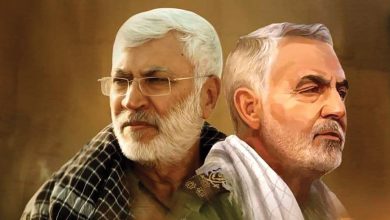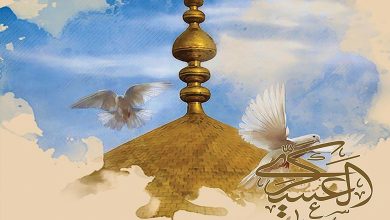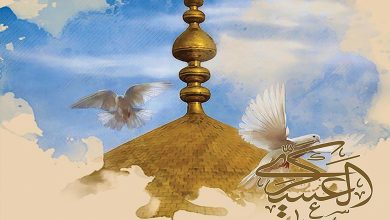Part Four: Soleimani and Religious Authority – A Special Bond with Najaf, Qom, and Tehran (Section Nine)

 Political Section
Political Section
The Humanitarian Outlook of Martyr Qasem Soleimani
Haj Qasem believed that defending the oppressed is both a religious and a human duty, regardless of their religious or ethnic affiliation. According to Iranian media outlets such as Tasnim News Agency, he stressed that “the Islamic Republic does not distinguish between Islamic sects and supports anyone who stands up against oppression and terrorism.” This principle was clearly reflected in his positions toward non-Shia communities, where he worked to protect Christians, Yazidis and other minorities in Iraq and Syria, arguing that takfiri terrorism, like ISIS, is a threat to everyone.
Soleimani’s role in protecting churches
In Iraq and Syria, Soleimani was at the forefront of the fight against ISIS, a group that targeted churches and religious minorities with extreme brutality. During the liberation battles for cities such as Mosul and Tikrit, he played a central role in organizing Popular Mobilization Units (PMU) and coordinating with the Iraqi army to retake areas devastated by ISIS. Reports from Al-Mayadeen indicate that Soleimani insisted on ensuring the safety of holy sites, including Christian churches that had been attacked by ISIS.
In Mosul — historically a center of Iraqi Christianity — Soleimani’s involvement in the 2016 liberation operations helped enable Christians to return to churches that ISIS had damaged. Iraqi sources such as abdal.co reported that he ordered forces under his influence to protect churches and monasteries, stressing that “protecting sacred religious sites is the duty of every Muslim.” This approach restored hope to Christian communities suffering displacement and persecution.
The liberation of the Yazidis in Iraq
When ISIS attacked Sinjar in northern Iraq in 2014, it committed horrific crimes against the Yazidis, including massacres, abductions and enslavement. Soleimani was among the first commanders to respond to this catastrophe. Iranian and Iraqi reports, including coverage by Fars News Agency, state that he directed the 2015 operation to liberate Sinjar in coordination with PMU forces and Kurdish Peshmerga. He helped establish safe corridors to rescue thousands of besieged Yazidis on Mount Sinjar and played a role in freeing hundreds of Yazidi women and children from ISIS captivity.
Local Iraqi sources reported that Soleimani personally followed operational details in Sinjar and emphasized the necessity of protecting the Yazidis as part of his human and religious duty. In a letter to Iran’s Supreme Leader, Ayatollah Khamenei, he described “liberating the oppressed from ISIS” as a victory for humanity, reflecting his inclusive view of jihad as defending all the oppressed regardless of their faith.
The rescue of the nuns of Maaloula in Syria
In December 2013, Jabhat al-Nusra (the Syrian branch of al-Qaeda) kidnapped thirteen nuns from the St. Thecla convent in Maaloula, a historic Christian town in Syria known for its monasteries and churches. The abduction was a major shock to Syrian Christians, who had already suffered destruction and displacement at the hands of extremist groups.
Soleimani played a decisive role in securing the release of the nuns. Al-Mayadeen reported that he coordinated precise military operations with the Syrian army and allied resistance forces that led to the nuns’ release in March 2014. That operation was not only a military success but also a powerful statement that protecting Christians and their holy sites was an integral part of the resistance mission. Syrian sources reported that Soleimani ordered that the nuns’ safety be guaranteed throughout the operation and emphasized that “defending Christians in Syria is an Islamic duty because Islam calls for the protection of the People of the Book.”
After the nuns’ release, Mother Pelagia Siaf, head of the St. Thecla convent, thanked those who had carried out the rescue and said the nuns felt secure thanks to the rescuers’ commitment to preserving their lives. Accounts published on outlets such as the Lebanese Forces website corroborated Soleimani’s commitment to protecting Christians amid the Syrian war.
A comprehensive approach to protecting minorities
Soleimani’s role went beyond military operations; he also worked to build bridges of trust with religious minorities. In Iraq he strove to unite various groups — Sunnis, Shias, Christians and Yazidis — in the fight against terrorism. According to abdal.co, he believed that “the unity of Iraqis in all their diversity is the strongest weapon against ISIS and U.S. occupation.”
This approach made him a symbol of humanitarian solidarity, treating Muslims, Christians and Yazidis alike and striving for justice. In Syria, his involvement in battles such as al-Qusayr in 2013 and in operations to liberate cities including Aleppo and al-Buqamal played a key role in protecting Christian communities and other minorities from ISIS and Jabhat al-Nusra. Official Syrian news agency SANA reported that Soleimani personally oversaw operations that safeguarded areas with Christian majorities — for example, the Armenian quarter of Aleppo — thereby contributing to the preservation of Syria’s religious and cultural diversity.







